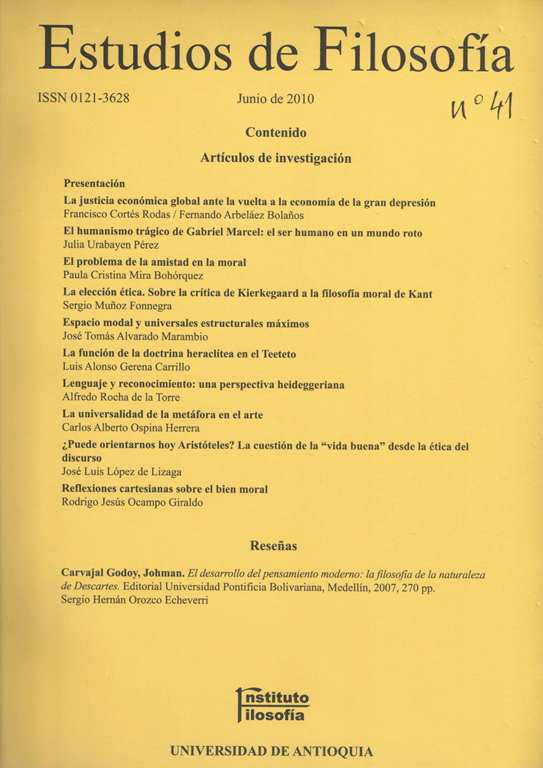The Function of the heraclitean doctrine in the Theetetus
DOI:
https://doi.org/10.17533/udea.ef.11607Keywords:
Heraclitean doctrine, Protagoras, relativism, PlatoAbstract
In this paper I try to show that the function of the Heraclitean doctrine in the Theetetus is to argue for the equivalence between the Protagorean thesis and Theetetus’ first definition “perception is knowledge”, and therefore the doctrine supports the relativity of knowledge. This reading goes against the interpretation according to which Plato introduces this doctrine because he believes it is right about that which is perceptible through the senses; but it goes a step beyond the interpretation which sustains that Plato introduces this doctrine as an ontological thesis to support the Protagorean thesis.
Downloads
References
ARISTÓTELES (1982) Metafísica, ed., trad. y notas V. García Yebra. Madrid, Gredos.
ARISTÓTELES (1987) Tratados Breves de Historia Natural. Acerca de la Generación y la Corrupción, trad., intr. y nts. E. La Croce, Madrid, Gredos.
BOERI, M. (2006) Platón. Teeteto. Introducción, traducción y notas de Marcelo Boeri. Buenos Aires, Losada.
BOERI, M. (2007) Apariencia y Realidad en el Pensamiento Griego, Buenos Aires, Colihue.
BURNYEAT, M. F. (1990) The Theaetetus of Plato. Indianapolis, Hackett Publishing Company.
BURNYEAT, M. F. (1982) Idealism and Greek Philosophy: What Descartes Saw and Berkeley Missed, Philosophical Review, 91, 3-43. DOI: https://doi.org/10.2307/2184667
CORNFORD, F. M. (1935) Plato’s Theory of Knowledge. The Theaetetus and the Sophist of Plato. Translated with a commentary. London, Routledge.
CHAPPELL, T. (2005), Reading Plato’s Theaetetus, Indianapolis/ Cambridge, Hackett Publishing Company.
CHERNISS, H. F. (1957) The Relation of the Timaeus to Plato’s Later Dialogues, American Journal of Philology, 78, 225-66. DOI: https://doi.org/10.2307/292120
DUKE, E. A. et al. (1995) Platonis Opera. Oxford, Oxford Classical Texts.
GERENA, L. et al. (2000) Introducción a la teoría estoica de las pasiones (fragmentos estoicos sobre las pasiones, selección y traducción), Revista Semestral Signos Filosóficos, Departamento de Filosofía, CSH / UAM / Iztapalapa, vol. II, núm. 3, enero-junio, 2000, pp. 181-201.
GERENA, L. et al. (2009) La descripción platónica de la percepción, Revista Ideas y Valores, 139, volumen LVIII, abril.
IRWIN, T. H. (1977) Plato’s Heracliteanism, Philosophical Quarterly, 27, 1-13. DOI: https://doi.org/10.2307/2218924
LIDDELL, H. G. and SCOTT, R. (1983) Greek-English Lexikon. Oxford, Oxford at the Clarendon Press.
LONG, A. A. y SEDLEY, D. N. (1997) The Hellenistic Philosophers. Cambridge, Cambridge University Press, 2 vols.
McDOWELL, JOHN (1973) Plato: Theaetetus. Translated with notes. Oxford, Clarendon Press.
SAYRE, K. M. (1969) Plato’s Analytic Method. University of Chicago Press, Chicago and London.
TODD, ROBERT B. (1976) Alexander of Aphrodisias on Stoic Physics. A study of the De Mixtione, with preliminary essays, text, translations and commentary, en: Philosophia Antiqua, a series of monographs on ancient philosophy, W. J. Verdenius y J. H. Waszink (eds.), vol. XXVIII. Leiden.
PLATÓN (1988) Teeteto. Traducción, introducción y notas A. Vallejo Campos. Madrid, Gredos, v. 5.
Downloads
Published
How to Cite
Issue
Section
Categories
License
Copyright (c) 2010 Luis Alonso Gerena Carrillo

This work is licensed under a Creative Commons Attribution-NonCommercial-ShareAlike 4.0 International License.
Authors who publish with this journal agree to the following terms:
1. The Author retains copyright in the Work, where the term "Work" shall include all digital objects that may result in subsequent electronic publication or distribution.
2. Upon acceptance of the Work, the author shall grant to the Publisher the right of first publication of the Work.
3. The Author shall grant to the Publisher a nonexclusive perpetual right and license to publish, archive, and make accessible the Work in whole or in part in all forms of media now or hereafter known under a Creative Commons Attribution-NoCommercia-ShareAlike (CC BY-NC-SA 4.0), or its equivalent, which, for the avoidance of doubt, allows others to copy, distribute, and transmit the Work under the following conditions: (a) Attribution: Other users must attribute the Work in the manner specified by the author as indicated on the journal Web site;(b) Noncommercial: Other users (including Publisher) may not use this Work for commercial purposes;
4. The Author is able to enter into separate, additional contractual arrangements for the nonexclusive distribution of the journal's published version of the Work (e.g., post it to an institutional repository or publish it in a book), as long as there is provided in the document an acknowledgement of its initial publication in this journal;
5. Authors are permitted, and Estudios de Filosofía promotes, to post online the preprint manuscript of the Work in institutional repositories or on their Websites prior to and during the submission process, as it can lead to productive exchanges, as well as earlier and greater citation of published work (see The Effect of Open Access). Any such posting made before acceptance and publication of the Work is expected be updated upon publication to include a reference to the Estudios de Filosofía's assigned URL to the Article and its final published version in Estudios de Filosofía.















